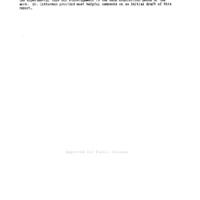-
Title
-
Effects Of Task Organization, Training Time, And Retention Interval On The Retention Of Skill
-
Date
-
1962
-
Index Abstract
-
Not Available
-
Photo Quality
-
Not Needed
-
Report Number
-
AMRL TDR 62-107
-
Creator
-
Naylor, James C.
-
Briggs, George E.
-
Reed, Walter G.
-
Corporate Author
-
Aerospace Medical Research Labs Wright-Patterson AFB Ohio
-
Laboratory
-
Behavioral Sciences Laboratory
-
Extent
-
26
-
Identifier
-
AD0289890
-
Access Rights
-
OTS
-
Distribution Classification
-
1
-
Contract
-
AF 33(616)-7269
-
DoD Project
-
1710
-
DoD Task
-
171003
-
DTIC Record Exists
-
No
-
Distribution Change Authority Correspondence
-
None
-
Distribution Conflict
-
No
-
Cover Price
-
0.75
-
Abstract
-
Three variables (amount of training, task organization, and length of the retention interval), each at two levels, were studied to evaluate their influence upon the long-term retention of skill. Subjects were assigned to each of the eight experimental conditions, and were given practice on the criterion task for 2 or 3 weeks. The criterion task was composed of two subtasks, a procedureal task involving the learning of discrete responses to discrete stimuli and a tracking task which involved continuous control of a three-simensional compensatory display. All subjects returned for a retention test either 1 or 4 weeks subsequent to the end of the training. Amount of training had a significant influence upon the degree of measured retention loss, as did task organization under conditions of lesser training. This was found for both tracking performance and for the number of omissive errors committed in performing the procedural task. Amount of absolute retention was generally related to (a) amount of training, (b) task organization, and (c) the length of the retention interval.
-
Report Availability
-
Full text available
-
Date Issued
-
1962-09
-
Provenance
-
Lockheed Martin Missiles & Fire Control
-
Type
-
report
-
Format
-
1 online resource
 AMRLTDR62-107.pdf
AMRLTDR62-107.pdf